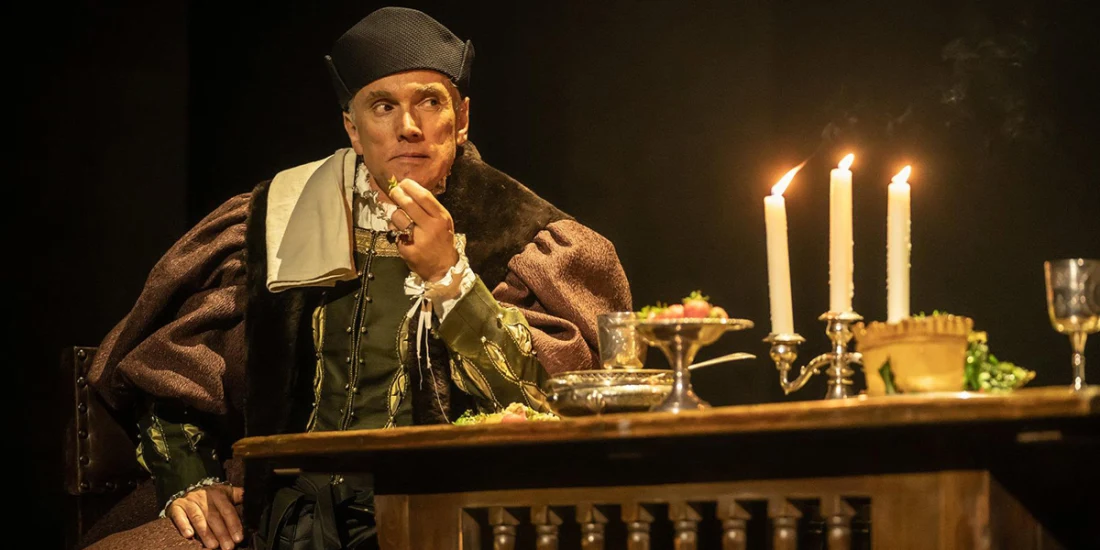'The Mirror and the Light' review -a compelling play benefits from Ben Miles' exquisite performance
In Hilary Mantel's 2020 novel The Mirror and The Light, the conclusion of her epic trilogy fictionalising the rise and fall of Tudor courtier Thomas Cromwell, the final stages of the story draw together what has up to that point been a sprawling and sometimes disjointed-feeling narrative into a whole that coheres only in hindsight — ours, and Cromwell's. Now that it's all done, we can see the missed opportunities, overlooked hints, the signs the wind was changing.
The 2021 stage adaptation of The Mirror and The Light has an unfortunately similar feeling. While there is much to enjoy, there is little to truly admire, and in the end it feels like a missed chance to make something remarkable out of a gorgeous source text and exquisite central performance.
Ben Miles is perfectly cast as Cromwell, the Putney blacksmith's son who rises to the right hand of King Henry VIII, helped usher in England's break with Rome, and oversaw both his marriage to and separation from the infamous Anne Boleyn. But that's all in the past when the play begins: we open on Cromwell in prison, everything lost.
Miles embodies Cromwell's contradictions — gruff gentility, hardscrabble arrogance, and icy competence — with unforced ease, though maybe it's not a surprise he lives to readily in the dialogue, given he helped write it. But it's in his body as well, the power he commands onstage, his inability to ever really, fully disappear, much as his enemies would like him to. Though the play swirls with a supporting cast of enemies and allies (Leo Wan is particularly delightful as the snobbish Richard Riche, Jordan Kouame and Geoffrey Lamb moving and charming in turn as Rafe Sadler and Thomas Wriothesley respectively, and Melissa Allan sharp and grounded as Mary Tudor), Cromwell's true opposite number is Nathaniel Parker's Henry, a study in the chilling caprices of absolute power as Henry careens from wife to wife — Seymour to Cleves to Howard — and from whim to whim.
Christopher Oram's concrete and metal set suggests a less traditional take on the story than actually unfolds. The compelling beauty of Mantel's novels lies in part in how they place us so firmly in Cromwell's own mind, infamously avoiding using his name in narration. This effect would be extremely difficult to achieve onstage, but if a clever playwright managed it, it could be something pretty remarkable. Mantel and Miles, neither of whom have had a play produced before, simply don't have the dramaturgical skill to pull it off — nor do they seem to try. The play is extremely dialogue-heavy, as if neither seemed to trust the conveyance of information to any stage device besides words.
The result is a play that moves along well and is often compelling, especially thanks to Miles's and Parker's performances, but lacks the suspense and beauty of the novel. Information is conveyed: a conflict between Cromwell and the son who chafes against his father's legacy; Cromwell's betrayal by one of his protegees, the creeping fear that Henry no longer trusts him. But Mantel's own most subtle and artistic scenes — a shadow lurking at the bottom of a tower with flowers in his arms, a drink in a garden while admiring plates painted with the Apostles — are not even attempted.
The adaptations of Mantel's first two novels, Wolf Hall and Bring Up The Bodies, had the easier job of showing Cromwell's rise. There were wives to elevate and behead, a religious revolution to undertake, laws and policies and ways to make a mark. The mark has been made, and The Mirror and The Light has the much harder dramaturgical job of watching Cromwell try to defend it. It's good enough, but it could have been so much more.
Photo credit: Ben Miles in The Mirror and the Light (Photo by Marc Brenner)
Originally published on
